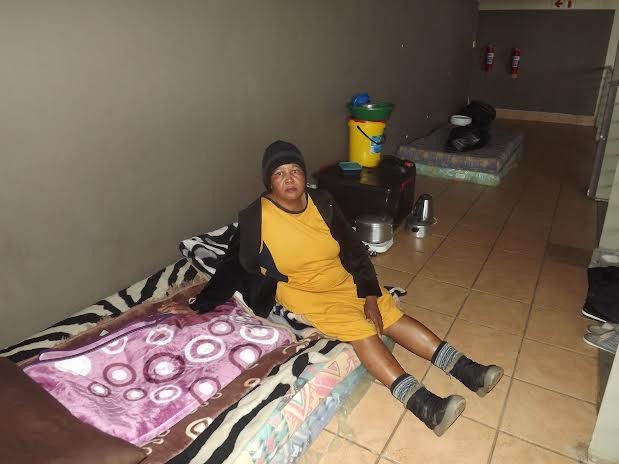
19 July 2023
Maria Mokgethi has been living in a community hall since floods destroyed her shack in February. Photo: Warren Mabona
Maria Mokgethi, 61, returned from work to her home in Willow Farm, Tshwane, in February to find the bottom half of her shack flooded. Since then she has been living with scores of people at the Nellmapius Community Hall in Mamelodi, desperately hoping the City of Tshwane will come to her aid.
People displaced by flooding in several informal settlements in the city have been living in the hall for about five months. Women and children live near the front and men near the back. There are toilets, water and electricity, but Mokgethi, like the others, is desperate to leave.
Mokgethi sleeps on two sponge mattresses on the first floor of the building. She cooks and keeps all her belongings in a small space next to her bed. At night, cold air comes in through the windows.
“I don’t have enough blankets and I’m always sick,” said Mokgethi.
She uses her old-age grant to buy food and medication and says she has no money left for blankets or a better bed.
The hall is noisy and crowded and Mokgethi and the other residents feel unwelcome in the area. They say some residents of Nellmapius want to remove them from the hall so that they can use the venue again, including the library.
“It’s tough to be in a place like this at my age,” says Mokgethi. “But I don’t want to go back to Willow Farm to rebuild my home because I don’t have enough money and I fear that my home will be flooded again in summer. I really need a house or a shack on proper land. I want to start a small business selling sweets, snacks and vetkoek because my old-age grant is not enough.”
Mokgethi, originally from Brits in the North West, has two grown-up children who live with their own families.
She used to work for a clothing firm in Mamelodi but was laid off last year when she turned 60. Since then she has worked as a casual worker, doing piece jobs including cleaning. She returned home from work one afternoon in February to find her shack destroyed. She lost most of her possessions.
“I was taking care of myself before I lost my home. I still want to take care of myself,” she says.
Spokesperson for the City of Tshwane Lindela Mashigo said the City had provided food parcels, blankets, mattresses and toiletries when the flood victims, initially 700, were moved to the hall on 5 February. He said the programme of providing assistance to the victims became unsustainable as their stay was extended, but did not explain further.
Currently there are 148 people in the hall, he said.
Mashigo said the City was engaging with the province on the relocation of the flood victims and with the Department of Social Development “to assist flood victims with necessities through non-governmental organisations”.
“The City currently does not have the budget to provide necessities, such as food and blankets.”
He confirmed that community leaders in Nellmapius had raised the issue of moving the flood victims and using the hall. “The venue in question is a community hall which was originally built for community use,” said Mashigo.
GroundUp sent further questions to the City’s media desk on 14 July to ask for more information on what the City is doing to help people like Mokgethi, and whether the City’s disaster fund budget has run out. The City did not respond, despite Mashigo’s promise on 17 July that it would do so.